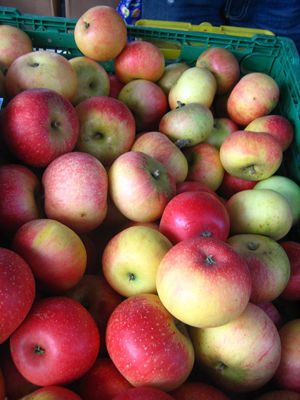Tickling taste buds

March 3, 2015
Hard-pressed to bolster the cider apple industry in Washington state, a team of WSU scientists has received a grant to continue their research in the fast-growing science of cider apple production.
Carol Miles, a vegetable horticulture professor at the WSU Mount Vernon Research Center, has been researching cider apples since 2007. Last year, her team found that bruises on apples left by mechanical harvesters do not affect the quality of juice. Mechanical harvesters have generally not been used on apple trees because the fruit are likely to get bruised, Miles said. Her team is the first to experiment with mechanical harvesters and to find that bruises do not affect juice quality.
This discovery earned them a grant of $40,000 from the WSU College of Agricultural, Human and Natural Resource Sciences (CAHNRS).
The grant is one of eight awarded by CAHNRS, and is meant to provide a seed fund to lift innovative agricultural projects off the ground.
The next step, Miles said, is to complete the fermentation process using mechanically harvested apples to see if bruised fruit produces a quality final product. Innovations in mechanized harvesting are also a priority.
“Mechanization is a key factor in this industry,” Miles said.
A panel of trained tasters use their expertise to qualify each type of juice, but human palettes get tired, said Carolyn Ross, assistant professor of food science.
To account for fatigue, Miles’ research has been aided by the help of an electric tongue, a large computer bristling with tubes and wires.
“The electric tongue mimics the human tongue by analyzing compounds associated with different qualities,” Ross said. “Sweetness, sourness, dryness… it picks up all of it.”
The machine is used to lighten the load when there are a lot of samples to run, and when the sample size is too small for a panel evaluation.
Ross said defining these qualities with human palettes and computerized data will help create a culture of cider-lovers similar to that of wine-connoisseurs.
Miles said the electric tongue’s role is to shrink the margin of human error.
Peter Tozer, research assistant and collaborator with Miles, said mechanical harvesting could be a key to widening the cider apple market in Washington.
Although apples are damaged in the harvesting process, the apple buyers are concerned about the certain characteristics that lead to different juice qualities.
“Cider makers don’t really care about aesthetics,” said Tozer. “They use different combinations of apples that create different qualities in the cider.”
For example, the plant compound tannin causes bitterness in cider, as well as wine.
Tozer’s job is placing a value on different types of cider apples, based on the results of cider evaluations from the panel and the electric tongue.
Miles’ research on mechanical harvesting could potentially be used to enhance the dessert apple industry as well, if researchers can figure out how to make the machine gentler, she said.
Cider makers buy apples regardless of condition, but the apples sold at grocery stores need to be as close to perfect as possible.
“We’d like to learn from these mechanical processes and try to modify them to work with dessert apples,” Miles said.



















